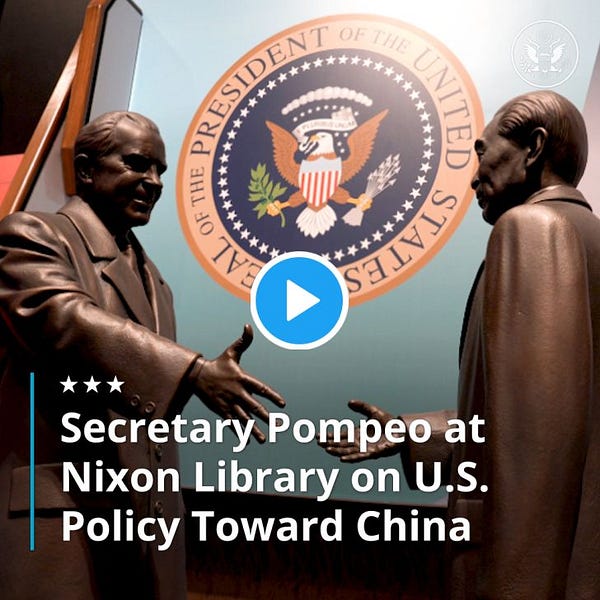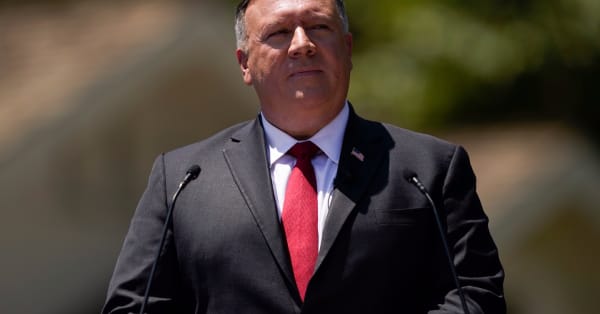Welcome to Newsletter 30 of Trade War and the continuing downward spiral in U.S.-China relations. The new low in the relationship was achieved this week by the U.S. decision to close the Chinese consulate in Houston, Texas, alleging widespread spying, and the Chinese response shuttering the U.S. consulate in Chengdu, Sichuan, a key post for monitoring Tibet and Xinjiang.
Meanwhile, U.S. secretary of state Mike Pompeo delivered a stinging speech attacking the Chinese Communist Party, widely seen as a call to end the already tattered policy of engagement with China.
Tit for tat consulate closures
While the U.S. has accused China of massive spying, saying that made the shuttering of the Houston consulate necessary, “in the Chinese telling, Beijing is under assault, as the Trump administration goes after it with increasing intensity on trade, technology and human rights,” reported the New York Times.
“The United States has recently stirred up troubles in relations with China to the point of hysteria,” said Xinhua News Agency in an editorial. The Chinese response: closing down the Chengdu consulate, one of six diplomatic outposts (including the embassy in Beijing), that the U.S. has had in China.


Be sure to listen to the music that accompanies this odd video of the Chinese side taking back control of the vacated U.S. Consulate in Chengdu.
“Distrust and verify”
In a speech widely seen as marking the end of the policy of engagement that has defined the U.S. approach to China since diplomatic relations were established in 1979, secretary of state Mike Pompeo called for a new far more confrontational approach to the relationship with the Chinese leadership.
“President Reagan said that he dealt with the Soviet Union on the basis of “trust but verify.” When it comes to the CCP, I say we must distrust and verify,” Pompeo said speaking at the Richard Nixon Presidential Library and Museum in Yorba Linda, California. “We have to draw common lines in the sand that cannot be washed away by the CCP’s bargains or their blandishments.”


And the Pompeo speech is one of three made recently by top U.S. officials of course, which together make up a “remarkable re-framing of the U.S.-China relationship,” tweets Tom Orlik, chief economist at Bloomberg Economics.


Pushback from the foreign policy establishment
The Pompeo speech drew establishment pushback however, and notably so from Richard N. Haas, president of the Council on Foreign Relations, writing in the Washington Post. “An effective U.S. policy toward China would work with, not against, our allies and partners.”
“Instead, under this administration, we treat the European Union as an economic foe, bash South Korea and Japan over how much they pay to offset the costs of our stationing soldiers on their territory and regularly raise doubts as to our reliability, be it by unilaterally canceling military exercises on the Korean Peninsula or threatening to withdraw some of our troops from South Korea.”
“It is not realistic to expect allies to stand up to a powerful neighbor if they cannot count on us,” Haas continued.


The knife in the oyster and open it right up
“This is the evangelical side of America,” journalist and author Orville Schell said in an interview with the Los Angeles Times, describing the attitude popular in Washington that engagement could change China. “We thought the persuasiveness of the American proposition would ineluctably change a country like China. … We had the internet, the market, you name it. We thought we’d get the knife in the oyster and open it right up.”


My entrepreneurial spirit has been dampened
Meanwhile, China’s abrasive new style of diplomacy is hurting the prospects of China’s ambitious tech companies, reported Reuters. “China’s top tech players are having contracts cancelled, products banned and investments blocked, with more restrictions on the horizon.”
“What we are experiencing now is unprecedented … My entrepreneurial spirit has been dampened due to all this, let alone global ambitions,” Reuters quoted one Chinese tech entrepreneur saying.


Larder, arsenal, and bank
A former chief economic advisor to the Indian government argues that China has lost what could have been a good opportunity to strengthen its global standing, during the covid-19 pandemic.
“By choosing unprovoked aggression over enlightened generosity, China has squandered that historic opportunity and possibly also revealed its true character. Soft power, China appears to believe, is for wimpy democracies. Scorpions sting. The world must take steps to respond,” wrote Arvind Subraman for Project Syndicate.


Notable/In Depth
Here’s an interesting piece looking at the earlier rise and fall of the once popular policy of import substitution—perhaps worth reading in this time of policies that aim to “reshore” manufacturing to the U.S., Taiwan and Japan.


Discussing the internal challenges, including the hukou, that hold China’s economy back, in this conversation I had with Mumbai’s Gateway House: Indian Council on Global Relations.


How China has been able to move up the global value chain in the middle of a trade war is explained by HSBC’s Frederic Neumann in this short video.
Upcoming talk
China’s governmental policies that are hindering a better life for its citizens and holding back its economic transition will be the subject of my talk this Thursday evening at the Northwest China Council in Portland, OR. Details in the link.



